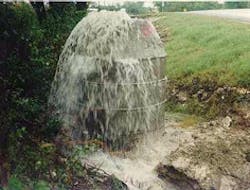Kentucky City Agrees to Major Sewer System Upgrades
The Lexington-Fayette Urban County Government (LFUCG) in Kentucky has agreed to make extensive improvements to its sewer systems at a cost estimated to exceed $290 million. The updates will help eliminate unauthorized overflows of untreated raw sewage and reduce pollution levels in urban storm water.
In addition, LFUCG will pay a civil penalty of $425,000 to the U.S. and implement two federal and two state environmental projects valued at $2.73 million that will provide additional environmental benefits to the Lexington community.
The settlement was announced jointly by the U.S. Justice Department, the U.S. Environmental Protection Agency (EPA) and Kentucky's Environmental and Public Protection Cabinet. The consent decree, lodged in the U.S. District Court for the Eastern District of Kentucky in Lexington, resolves the joint federal and state complaint filed in November 2006.
"Today's settlement represents a significant commitment by LFUCG to address its aging sewer systems for the long term and bring much-needed protection to human health and the environment in the Lexington area," said Ronald J. Tenpas, assistant attorney general for the Justice Department's Environment and Natural Resources Division.
"Sewer overflows and pollution in urban storm water are major problems that affect water quality in the Southeast and across the entire country," said EPA Regional Administrator Jimmy Palmer. "Bringing systems like LFUCG's into compliance is one of EPA's top enforcement priorities."
LFUCG owns and operates a sanitary sewer system which includes two major wastewater treatment plants serving a population of almost 250,000. It also owns and operates a separate storm sewer system that collects urban storm water. Inadequacies in LFUCG's sewer systems' infrastructure and management programs have resulted in unlawful discharges of millions of gallons of untreated sewage into streams in the Lexington/Fayette County area and increased pollution levels in urban storm water.
The major features of the consent decree relating to the sanitary sewer system will require LFUCG to identify and quantify the capacity, design and condition of the components of its sanitary sewer system, including pump stations and treatment plants; develop and implement remedial measures to eliminate recurring overflows within 11 to 13 years; and improve its management, operation and maintenance programs to prevent future overflows and respond when they occur.
In addition, the consent decree contains provisions requiring LFUCG to substantially upgrade its programs to reduce pollution in its storm sewer system. For example, LFUCG will establish a funding mechanism for its storm water management programs and adopt ordinances to better address pollution sources such as construction sites, developed areas and industrial sites. Moreover, LFUCG will need to meet minimum levels of inspection, screening and monitoring to identify and better address sources of pollution in its storm water system.
Source: U.S. Department of Justice
